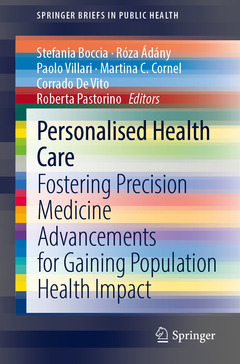Description
Personalised Health Care, 1st ed. 2021
Fostering Precision Medicine Advancements for Gaining Population Health Impact
SpringerBriefs in Public Health Series
Language: English
Subjects for Personalised Health Care:
Keywords
public health genomics; personalized health care; chronic disease prevention; precision medicine; genomic medicine; population health; screening of genetic diseases; predictive genomic applications; ethico-legal issues in personalized medicine; health policy issues and personalized medicine; human genome; identification of biomarkers for prevention; primary; secondary; and tertiary prevention; genetic screening of healthy adults; economic evaluation of genetic/genomic applications; implementation of genetic services; delivery of personalized care; organizational models; sociotechnical analyses
120 p. · 15.5x23.5 cm · Paperback
Description
/li>Contents
/li>Biography
/li>Comment
/li>
- Identification of biomarkers for theprevention of chronic disease
- Evaluation of predictive genomic applications
- Ethico-legal and policy issues surrounding personalised medicine
- Roles and responsibilities of stakeholders in informing healthy individuals on their genome: a sociotechnical analysis
- Identification of organisational models for the provision of predictive genomic applications
Introduction (Boccia).- 1. Chapter 1: Identification of biomarkers for the prevention of chronic disease (Editors: Adany, Boccia).- 2. Chapter 2: Evaluation of predictive genomic applications (Editor: Villari). -3. Chapter 3: Ethico-legal and policy issues surrounding personalised medicine (Editor: Sandor).- olicy issue, with a focus on citizens and DTC) 3.4 Sandor (Legal issue).- 4. Chapter 4: Roles and responsibilities of stakeholders in informing healthy individuals on their genome: a sociotechnical analysis (Editor: Cornel).- 5. Chapter 5: Identification of organizational models for the provision of predictive genomic applications (Editor: De Vito).




